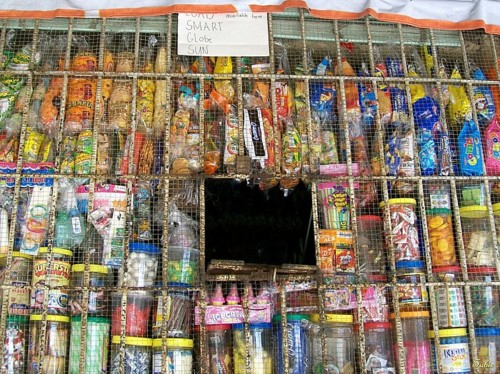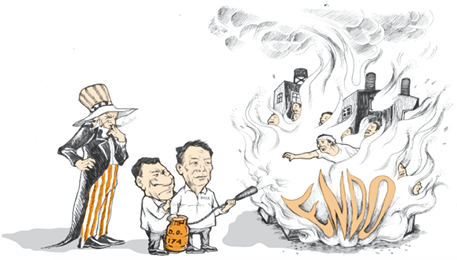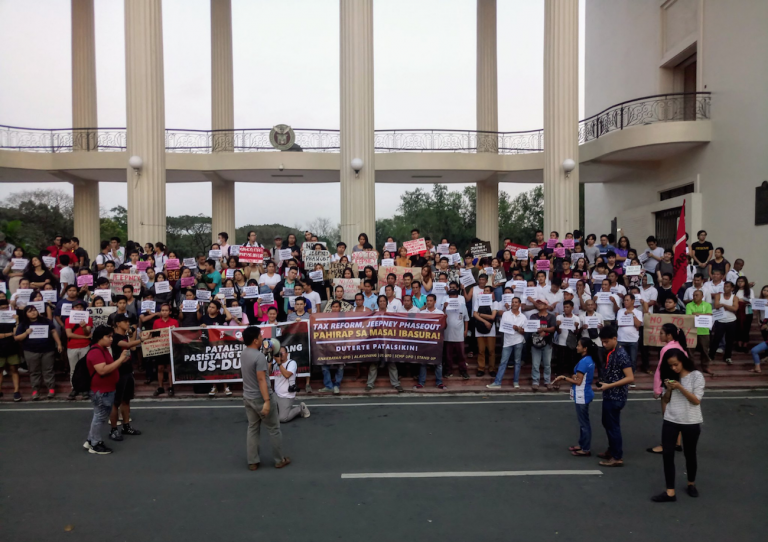Artists demand justice for renowned social realist painter
Activists press high court to dismiss petition vs chief justice
First quarter of TRAIN: A preview of the worse to come for the poor
Nanay Inday joins the many ordinary folk in bearing the brunt of price hikes upon the January 2018 implementation of the first package of the Duterte administration’s Tax Reform for Acceleration and Inclusion (TRAIN). A resident of the urban poor community in San Roque North Triangle, she laments that there are no longer Php5.00 bundles of okra, pechay, string beans and camote tops, which now all cost at least Php10.00 per bundle. In other communities, rice has gone up by Php2.00-Php3.00/ kilogram (kg), and the prices of dressed chicken and pork have also increased by Php20.00-Php30.00/kg.
While TRAIN puts more money into the pockets of 5.5 million of the highest-earning 9.1 million households through reduced personal income tax (PIT) and lower estate and donor’s taxes, the price surges in prime commodities and services have begun affecting the overwhelming majority of poor Filipinos without any income tax gains. They number to as much as 15.2 million families in greater poverty. Worse, inadequate cash transfer mechanisms provide little help.
Price hikes abound for consumers, producers. TRAIN’s indirect taxes are pass-on impositions, which translate into goods manufacturers and service providers imposing tax obligations on customers. The Department of Finance (DOF) continues to downplay the effects of TRAIN, pointing to ‘bigger culprits’ such as peso depreciation, rising global prices of petroleum products, profiteering, seasonality, and alleged artificial rice shortage created by the National Food Authority (NFA).
But the law has contributed to price swelling in oil products, food, grocery items, sugar sweetened beverages, electric charges, and other goods and services. These were factors behind a 3.4% inflation spike in January 2018, 3.8% in February, and 4.3% in March – the highest rates in more than three years. Using the 2012 base year, the first quarter inflation alone averaging 3.8% is already nearing the upper end of the 2-4.0% target range set by the Bangko Sentral ng Pilipinas (BSP) for this year.
The plight of the six poorest income deciles earning below the family living wage has begun to worsen as TRAIN taxes, especially additional taxes on oil, sugar sweetened beverages, tobacco, and new items with value-added tax (VAT) started impacting on prices across the economy. The considerable price hikes are validating earlier apprehensions that the new law is brazenly pro-rich and grossly anti-poor.
Consumers observe that fruits are up by Php10.00-60.00/kg. A 150-gram powdered milk bag, meanwhile, now costs Php9.00 more at Php52.00. A liter of powdered juice sachet now costs Php14.00-16.00 from Php8.00-9.00. Chocolate powdered drink packs previously retailed at Php50.00 now range from Php70.00-90.00. Though exempted from new taxes, 3-in-1 instant coffees have still recorded an increase of Php2.00-3.00 in sari-sari stores. In March, the Department of Trade and Industry (DTI) announced a Php1.12 increase in the prices of canned sardines following manufacturers’ demand for a Php1.00-2.00 adjustment due to higher fishing cost. But supermarket prices marked up twofold at Php2.40.
Inflation rates in housing, water, electricity, gas and other fuels also jumped to 2.9 percent in March from the same period last year. Filipinos have begun paying more as excise taxes on various petroleum products started rolling.
Sheer burden of excise on oil and more. Oil is widely used in households, farms, fishing communities, power generation, manufacturing, and transportation. A 2011 study by the NFA Employees Association, for instance, shows that oil-based inputs such as fertilizers, pesticides, machine fuel and transportation costs make up 18% of rice production cost.
TRAIN aggravates the impact of volatile oil price movement due to deregulation on prices. The final increase in the prices of petroleum products is even higher because the additional excise taxes are themselves also subject to 12% VAT. LPG, diesel, gasoline and kerosene excise taxes are scheduled to further soar in 2019 and 2020.
According to peasant group Kilusang Magbubukid ng Pilipinas (KMP), as producer, a farmer during harvest season uses 600 liters of diesel per hectare of land for land preparation and irrigation. The additional excise levy alone for this year will cost him Php1,500 more in 2018, Php2,700 in 2019, and Php3,600 in 2020, or a total of Php7,800 for three consecutive years. National federation of small fisherfolks organizations Pamalakaya meanwhile says that a fisherman who consumes 12 liters per voyage is now spending Php643 in contrast to Php516 in 2017. These figures exclude TRAIN-triggered price hikes in farmers’ and fisherfolks’ food and other family expenses.
Meanwhile, petitions for higher fares by the transport sector have begun piling up: for jeepney drivers and operators, a raise in the basic rate from Php8.00 to Php12.00; for ordinary bus operators within Metro Manila, a Php3.30 hike in the minimum fare, plus a peso for every succeeding kilometer, and Php2.95 more for minimum fare for provincial ones; for the ride-hailing company Grab, a Php 4.00 hike in its per kilometer charge. While fare costs remain status quo, TRAIN has eroded public utility vehicle (PUV) drivers’ average daily take home pay of Php500-600.
Besides fuel price spikes, power rates are further marked up due to the reinstatement of the 12% VAT in the power transmission charge of the National Grid Corporation of the Philippines (NGCP) and additional levy on coal from the current Php10 per metric ton in a Php50-100-150 hike scheme for three years. As a pass-on charge under the Electric Power Industry Reform Act (EPIRA), the law that liberalized the country’s energy industry, the growing power costs propelled by coal excise tax are shouldered by the consumers instead of the big-time coal businesses. Meralco has implemented a big TRAIN-triggered rate surge in February, which it imposed on an installment basis – Php0.75 per kilowatt hour (kwh) in February, Php0.85/kwh in March, and Php 0.23/kwh in April.
Reluctant help? Amid all the economic shocks diminishing the poor’s inadequate incomes, the DOF continues with its rosy assurances asserting that the price increase is “minimal and manageable” and will be offset by the unconditional cash transfers (UCT) for the 10 million poorest households. However, the TRAIN-sponsored social protection is late, insufficient, and temporary.
The promised additional Php200 cash subsidies in 2018 for the 4.4 million existing Pantawid Pamilyang Pilipino Program (4Ps) beneficiaries and 3 million indigent senior citizens only came in March. The rest of the 2.6 million recipients will purportedly get their subsidies much later in August or after eight months of suffering price hikes. Double counting may be happening to project higher figures of people aided. Many of the poor elderly are most likely already included in the conditional cash transfer (CCT) beneficiary households. Not all deeply impoverished Filipinos are covered by the 4Ps. The delay also simply highlights that this social mitigation measure is only an afterthought and exposes government’s ill-preparedness to genuinely help the poor cope with TRAIN.
The Php200 monthly dole out also falls short as the estimate was based on an inflation rate of 3.3 percent. The Center for Women’s Resources (CWR) cites the case of mothers in urban poor communities whose pre-TRAIN Php100 daily budget for food ballooned to Php156. This means that the additional Php200 allowance would be used up in just 4 days. In another community, the Php600 rice subsidy has been replaced with the Php200 UCT. The effects of TRAIN will be permanent, but this UCT gimmick, though increasing to Php300 per month in 2019, ends in 2021.
Other mitigating measures depend on the private sector’s discretion. Last month, the Department of Energy (DOE) signed a memorandum of agreement with Petron Corp., Pilipinas Shell Petroleum Corp., and Phoenix Petroleum Philippines. The companies pledged to expand their existing discount programs for public utility jeepneys by ensuring at least a Php1 discount per liter on liquid fuels, increasing the number of participating retail stations and including other PUVs. However, Phoenix announced that these discounts can only be availed of from 150 stations. Petron’s temporary 500 stations meanwhile are largely concentrated in the National Capital Region (NCR). With almost weekly oil price hikes, whatever reprieve provided by these oil players becomes negligible.
Reality check. Only the richest 20% of Filipinos earn the family living wage (FLW) or more (Php30,000. per month on the average for 5 persons). TRAIN gnaws into the already meager incomes of the poorest 60 million Filipinos who live below the FLW. Yet TRAIN’s apologists continue to harp on providing additional disposable income as a benefit of the PIT cuts.
TRAIN is also justified to boost the country’s revenue, which in turn will fuel government programs, mainly infrastructure projects and social services that will ultimately help the poor. But government’s TRAIN-funded Build Build Build will not only benefit the more economically established Central Luzon, Southern Tagalog, and NCR where the bulk of infrastructure shall be concentrated, instead of in the poorest regions. The grand infrastructure program will include the construction of airports, seaports, roads, highways, subways, railways, as well as industrial and commercial structures and complexes, which are all bound to collect expensive user fees from the public. The rise of infrastructure could in turn drive up the cost of goods and services, resulting in further price hikes. Thus the role of revenue to aid in price control is even reversed.
Not this way. Inarguably, every government needs revenues. But the framework of the country’s tax system apathetically presumes that the majority poor, who have too little income to begin with, can afford to lose some more pesos with the incessant price increases that TRAIN’s additional levies bring.
TRAIN does not recognize the glaring severe income inequality in the country. It allows for the richest, who have the more capacity to pay, to even take home tens of thousands of pesos more with reduced tax obligations despite the price hikes.
This is in clear violation of the Philippine Constitution which states that “the rule of taxation shall be uniform and equitable”. A genuinely progressive system of taxation has yet to be evolved.
Filipino workers’ plight continues
As International Workers’ Day approaches, many Filipino workers still endure poor quality jobs that lack benefits, are low-paying, insecure and under unfavorable working conditions. Those workers who attempt to assert their labor rights face repressive measures such as losing their jobs, violent strike dispersals, and other rights violations.
The Duterte administration’s pursuit and implementation of neoliberal policies, like the two-tiered wage system, compressed work week, and the executive order that does not end contractualization, have worsened the situation of workers.
Thus, Filipino workers and other marginalized sectors continue to fight for real measures that will not only end contractualization but advance a strategic plan for national industrialization. This is crucial in creating stable jobs for the Filipino people, and pushing genuine economic development. #LaborDay2018 #Facts&Figures2017
Rally held at San Francisco airport in support of detained Filipino activist
Jeepney Phaseout | Paano maaapektuhan ang mga komyuter sa PUV modernization program?
Suliranin sa karamihan ng mga Pilipino ang araw-araw na pamumuhay, mula sa pagkakasya sa badyet ng mababa-sa-minimum na sahod; sa pagtitiis sa masikip at maiinit na klasrum; sa pangangambang hindi na makahanap ng trabaho kapag nag-endo o “end of contract na”; sa apat na oras o higit pa sa gitna ng matinding trapik.
Bukod sa nabanggit, paanong dagdag na pahihirapan ng PUV modernization program ng gobyerno ang milyun-milyong ordinaryong mamamayan?
#WalangJeep
Noong sinimulan ng gobyerno ang Tanggal Bulok, Tanggal Usok noong Enero, naging mabigat na pasanin ang kakulangan ng mga jeepney sa lansangan.
Patotoo nito ang hulihan ng mga jeep sa University of the Philippines Diliman campus noong Pebrero 8, kung saan 97 jeepney ang pinatigil ng I-ACT (Inter-Agency Council on Traffic) sa kanilang biyahe. Ayon sa Land Transportation and Franchising Regulatory Board, marami umano sa mga ito ang hindi pumasa sa anti smoke-belching test at lumabag sa Land Transportation and Traffic Code.
Tagumpay man kung ituring ng gobyerno ang operasyon ng I-ACT, ngunit naging malaking perwisyo ito sa libu-libong estudyanteng pumapasok sa araw na iyon. Minimal lang ang naitulong ng sampung solar-powered jeepney na inilaan para ihatid ang mga estudyante sa kanilang mga destinasyon.
TINGNAN: Humaba ang pila ng mga pasahero papuntang UP sa may Katipunan Terminal kaninang umaga dahil sa kawalan ng masasakyang jeep. Ngayong araw ikinasa ng @DOTrPH sa UP Diliman ang Operation Tanggal Bulok Tanggal Usok sa mga jeepney.#NoToJeepneyPhaseout pic.twitter.com/kntKuPUX5A
— Philippine Collegian (@phkule) February 8, 2018
Where is the “social justice” enshrined in the constitution? The UP Diliman transportation system seems to be paralyzed. #NoToJeepneyPhaseout
— Kyle Victor Jose (@Smartteaser192) February 8, 2018
Di man lang maayos at formal memo. Kawawa ang mga pobreng driver na wala namang kakayahan ipaayos ang mga jeep nila more so iavil yang modernization na yan. #NoToJeepneyPhaseout pic.twitter.com/6Yebhhzmzr
— andrewalub (@andrewalub) February 8, 2018
Chosco. Nasan ang contingency plan ng gobyernong itey? Puro kafalfakan basta may masabi lang na “ginawa” o “change kuno”#ChangeScamming#GobyernoDeFalfak@LaBellaGlinda
— Princess Tan (@Pinopojo) February 8, 2018
Habang mahirap rin para sa mga komyuter ang makasakay dahil sa mga ikinakasang tigil-pasada ng Pinagkaisang Samahan ng mga Tsuper at Opereytor Nationwide (PISTON) at No To Jeepney Phaseout Coalition (NTJPOC), magkaiba ito sa programang Tanggal Bulok, Tanggal Usok.
Ipinaliwanag ni PISTON National President George San Mateo na ang tigil-pasada ay isang mataas na porma ng pagtutol sa PUV modernization program ng gobyerno. Pinapatunayan ng mga tigil-pasada ang abalang naidudulot sa mga komyuter kapag ipinatupad ang modernisasyon, o phaseout para sa mga mga tsuper at opereytor.
Mas mahal na pamasahe
Sasabihin ng mga umaayon sa phaseout na hindi naman maaabala ang mga komyuter dahil papalitan naman ang mga lumang yunit ng mga e-jeep. Marami nga lang pagkakaiba ang dalawa.
Bukod sa mas angkop ang lumang disenyo sa ating mga lansangan, klima, at sa pangmatagalan at malayuang biyahe, aabot lamang sa P200,000 hanggang P300,000 ang pagbubuo ng isang yunit ng jeep kumpara sa P1.6 milyon para makabili ng isang e-jeep.
Ayon sa Omnibus Franchising Guidelines ng Department of Transportation (DOTr), bawal ang single-unit operation ng e-jeep at kinakailangan ang minimum na 20 e-jeep para makakuha ng franchise sa LTFRB ; ibig sabihin, imposibleng makapagmay-ari ang mga indibidwal na opereytor ng franchise kung kaya mga pribadong kumpanya na lamang ang magiging opereytor ng mga bagong yunit.
Kusa ring tataas ang minimum na pamasaheng babayaran ng mga estudyante, manggagawa, at empleyado papunta at pabalik sa eskwelahan o trabaho. Mayroon nang pasulyap ang lokal na gobyerno ng Maynila sa e-tricycle nito, kung saan P20 ang minimum na bayad. Halimbawa, imbes na P8 lang ang biyaheng Divisoria hanggang Morayta o Recto, mas mataas pa sa doble ang kailangang iabot na pamasahe.

Route Rationalization
Kasama sa PUV modernization program ang pagbabago ng mga ruta ng mga jeepney batay sa mga plano sa pampublikong transportasyon ng mga lokal na gobyerno at sa pangangailangan ng mga komyuter. Isa sa mga partikular na layunin nito ang pagbabawal ng mga jeep sa mga pangunahing lansangan, kaya bus, MRT, at LRT na lang ang pagpipiliang sasakyan. Isang hakbang sana ang route rationalization upang maging maayos ang sistema ng transportasyon, ngunit karugtong nito nag iba pang mga suliranin: trapik sa mga mayor na lansangan at hindi maaasahang takbo ng mga tren.
Problema sa mass transport system at pambansang industriyalisasyon
Mula sa kawalan ng jeep sa mga kalsada hanggang sa madalas na pagkakasira ng MRT, malayo pa ang tatahakin upang makamit ang isang matinong sistema ng transportasyon sa Pilipinas. Kapag sinabi nating matino, ito ang komprehensibong pamamalakad ng transportasyon sa lupa, dagat, himpapawid, at mga tren na pangunahing nagsisilbi para sa publiko at hindi upang kumita ang gobyerno at mga pribadong korporasyon.
Hindi sinasagot ng PUV modernization program ang panawagan para sa maayos na mass transport system, bagkus lalo nitong isinasapribado ang isang batayang serbisyo.
Isang pangmatagalang solusyong tutugon sa problemang ito ang pambansang industriyalisasyon o pagbubuo ng sariling industriya ng Pilipinas. Binabago nito ang kalakarang eksport ng mga hilaw na materyales (tulad ng iron oxide ore) at importasyon ng mga yari nang produkto (bakal) mula sa mga industriyalisadong bansa.
Sa ilalim ng pambansang industriyalisasyon, maaaring lumikha ang gobyerno ng isang polisiya tungo sa lokal na pagmanupaktura ng mga bagong jeep, imbes na mag-import pa ng mga e-jeep mula sa mga dayuhang kompanyang Isuzu, Hino, Fuso, at Foton.
Malaking hakbang rin ang pambansang industriyalisasyon tungo sa paglunas sa pang-araw-araw na suliranin ng mamamayan: lupa, trabaho, edukasyon, at mga serbisyong panlipunan.
Sa paghangad ng ligtas at maginhawang byahe para sa mga pasahero, mainam kung pag-aaralan ng gobyerno ang mga solusyong aayon para sa nakararaming Pilipino — ang mga tsuper, opereytor, estudyante, manggagawa, empleyado, magsasaka — silang obligado nitong pagsilbihan.
The post Jeepney Phaseout | Paano maaapektuhan ang mga komyuter sa PUV modernization program? appeared first on Manila Today.
‘Not surprised,’ KMU says of Duterte’s turnaround on endo promise
GRADUATION SEASON
Some women flower vendors failed to sell their flowers after half a day at the graduation ceremonies held at the CAP building last Wednesday. The vendors were not allowed to sell inside the grounds reportedly to prevent congestion. (Medel V. Hernani/davaotoday.com)


